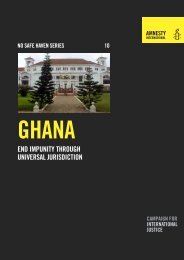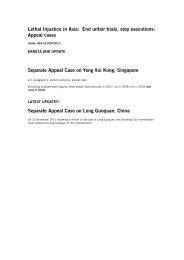read the report - Amnesty International
read the report - Amnesty International
read the report - Amnesty International
You also want an ePaper? Increase the reach of your titles
YUMPU automatically turns print PDFs into web optimized ePapers that Google loves.
NIGERIA<br />
‘WAITING FOR THE HANGMAN’<br />
21<br />
reviewed by a higher tribunal according to law.” The UN Convention on <strong>the</strong> Rights of <strong>the</strong> Child<br />
similarly guarantees <strong>the</strong> right to appeal to a higher and independent judicial body.<br />
There are at least 80 prisoners on death row who were sentenced to death by Robbery and<br />
Firearms Tribunals, with no right of appeal. 69 The Robbery and Firearms Tribunals established<br />
under <strong>the</strong> Robbery and Firearms (Special Provisions) Decree No. 5 of 1984 denied<br />
defendants <strong>the</strong> right to appeal and <strong>the</strong>ir composition contradicted fair trial standards, being<br />
made up of two people with a military or police background and one presiding civilian judge.<br />
Each of <strong>the</strong> three members of <strong>the</strong> tribunal had an equal vote. 70<br />
In 1999, jurisdiction was restored to <strong>the</strong> state-level High Courts, with a right of appeal<br />
to <strong>the</strong> Court of Appeal and Supreme Court. However, it is unclear how this relates to<br />
those who were convicted and sentenced to death by tribunals. In 2001, LEDAP attempted<br />
to appeal against a conviction and sentence by a Miscellaneous Offences Tribunal which<br />
similarly excluded right of appeal. The appeal stalled because <strong>the</strong> records of proceedings<br />
of <strong>the</strong> tribunal had been lost. 71 A lawyer who tried to follow up on a lost tribunal case file<br />
said: “The High Court has an archive of <strong>the</strong> records of proceedings, well, it is more a<br />
dump of all documents <strong>the</strong>y don’t need anymore. A heap of dusty documents, all mixed<br />
up, that contain decisions on people’s lives. Nothing is filed; you can hardly separate<br />
one case from <strong>the</strong> o<strong>the</strong>r. There is no way any of <strong>the</strong>se court proceedings can be found<br />
again easily.” 72<br />
Many of <strong>the</strong> death row prisoners sentenced by tribunals think it is better to apply for <strong>the</strong><br />
prerogative of mercy than to appeal. They fear that appealing would reduce <strong>the</strong>ir chance of<br />
being released as most prisoners wait at least five years for <strong>the</strong>ir appeal to be concluded. 73<br />
One prisoner who was sentenced to death by a tribunal said: “They try to tell us that <strong>the</strong>y<br />
will release us after 10 years. I don’t want to go to court.” 74 Ano<strong>the</strong>r prisoner explained:<br />
“I tried appeal. Welfare people [in prison] tell me <strong>the</strong>y can not do anything. This is my tenth<br />
year now, if I stand court now, I won’t get my freedom. Even some have been released before<br />
10 years.” 75<br />
The African Commission on Human and Peoples’ Rights found in two complaints that <strong>the</strong><br />
Robbery and Firearms Tribunal and <strong>the</strong> Civil Disturbances Special Tribunal violated <strong>the</strong> right<br />
to appeal guaranteed under Article 7 (1) of <strong>the</strong> African Charter on Human and Peoples’<br />
Rights. 76 The UN Human Rights Committee, <strong>the</strong> expert committee that monitors <strong>the</strong> ICCPR,<br />
has stated that <strong>the</strong> imposition of death sentences without <strong>the</strong> possibility of appeal is<br />
incompatible with <strong>the</strong> ICCPR, and constitutes a violation of <strong>the</strong> right to life. 77<br />
Four out of 10 prisoners on death row never filed an appeal, ei<strong>the</strong>r because <strong>the</strong>ir right to<br />
appeal was denied or because <strong>the</strong>y did not have <strong>the</strong> money for court fees and a lawyer.<br />
Hauwa (46) was 24 when she was arrested on 17 August 1986 suspected of murder.<br />
She waited almost nine years for her trial to be concluded and was sentenced to death on<br />
5 February 1995. “I did not have good legal presentation during <strong>the</strong> trial. That was why I was<br />
convicted and condemned.” Hauwa never filed an appeal: “I never had nobody to appeal”.<br />
After 22 years in prison, her mental health has deteriorated severely. 78<br />
Index: AFR 44/020/2008 <strong>Amnesty</strong> <strong>International</strong> October 2008

















